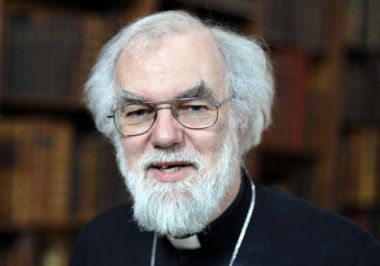Rowan Williams says Britain is 'post-Christian'

The former Archbishop of Canterbury, Lord Williams, has said that he believes the UK is neither a Christian nor a secularist nation, but rather it is "post-Christian".
Entering into a debate sparked by the Prime Minister after he said Britain was a "Christian country" and that Christians in the UK should be more "evangelical" about their faith, Lord Williams takes a more middle road view in an interview with the Sunday Telegraph.
He is cautious about defining Britain as a Christian country, because a "Christian nation can sound like a nation of committed believers, and we are not that".
However the former Archbishop, who is now Master of Magdalene College at Cambridge, did accept that there was strong cultural ties to Christianity in the UK.
"The cultural memory is still quite strongly Christian. And in some ways, the cultural presence is still quite strongly Christian," he said.
"[Britain] a Christian country as a nation of believers? No. A Christian country in the sense of still being very much saturated by this vision of the world and shaped by it? Yes."
He also rejected counter suggestion from humanist and secular organisations that Britain is a non-religious country.
"We are not a nation of dedicated secularists," Lord Williams maintained.
In response to David Cameron's comments, more than 50 prominent secularists led by Professor Jim Al-Khalil signed a letter in The Telegraph claiming that Britain was not a Christian country.
"Repeated surveys, polls and studies show that most of us as individuals are not Christian in our beliefs or our religious identities," they wrote.
Lord Williams takes the view that Britain is "a lot less secular than the most optimistic members of the British Humanist Association would think".
"If I say that this is a post-Christian nation, that doesn't mean necessarily non-Christian," he continued.
"[Britain] is post-Christian in the sense that habitual practice for most of the population is not taken for granted."
The former Archbishop shared how he retained a sense of optimism about the future of Christianity in Britain, while acknowledging that difficult challenges lay ahead.
"Given that we have a younger generation now who know less about [Britain's Christian] legacy ... there may be a further shrinkage of awareness and commitment," he said.
"The other side is that people then rediscover Christianity with a certain freshness, because it's not 'the boring old stuff that we learnt at school and have come to despise'.
"I see signs of that, talking to youngsters here at Magdalene and in school visits. There is a curiosity about Christianity."
The former Archbishop's views are shared by Susie Leafe, director of the evangelical Anglican group Reform. Speaking to Christian Today, she said: "I think we would be better to describe ourselves as a post-Christian country. We need to acknowledge that we have inherited laws and a culture shaped by Christianity."
She also suggested that while Britain may be leaving its Christian identity behind, what it is taking up instead is unclear, and therefore Christians need to better present the advantages of a strong faith presence in public life.
"We are in danger of frittering away our legacy without a coherent alternative," she said.
"David Cameron's comments reflect the latent Christian understanding that many in the UK relate to. The job of our churches is to say that there is so much more on offer."











